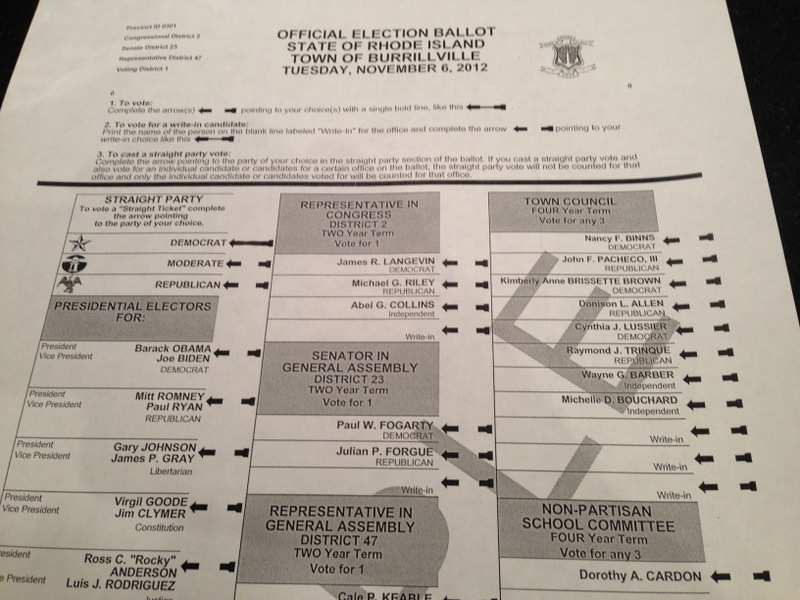 As the recent legislative session wound down on Smith Hill, the General Assembly passed resolution H5277, which asked the Board of Education not to use the high-stakes, standardized NECAP test as a graduation requirement.
As the recent legislative session wound down on Smith Hill, the General Assembly passed resolution H5277, which asked the Board of Education not to use the high-stakes, standardized NECAP test as a graduation requirement.
It said, in part:
“…this General Assembly hereby urges the Board of Education to reconsider the current graduation requirements including the use of the state assessment and examine using a weighted compilation of the state assessment, coursework performance, and senior project or portfolio; and be it further
RESOLVED, That this General Assembly respectfully requests that the Board of Education delay the state assessment portion of the graduation requirement to allow for adequate time for students to be immersed in the common core curriculum;”
Now the ball is in the Board’s court. Newly constituted and charged with a broader set of responsibilities than either of it predecessor boards, how they react to this resolution will be an indicator of how seriously they take their responsibility to re-examine a policy not of their making. Will they, elect for a “quick fix”, or will they take the opportunity to consider what is best for meeting the needs of the Rhode Island public education system?
Anticipating this question, I wrote to a noted critic of standardized testing, Diane Ravitch. In my email, I said I was interested in measuring learning “using instruments that look like the kinds of challenging performances schools and businesses require.”
Ravitch replied:
“The best example I know is the NY Performance Standards Consortium
20 years old
Great results”
So I looked up the New York Performance Standards Consortium and was amazed by what I found—it was as if I had entered a different world from the one that is being put in place here. Before I describe that world—at least partially—let me back up and review the reasons why finding an alternative world is so important, just sticking with issues related to testing students.
Many arguments have been advanced against using the NECAP as a graduation requirement. To my mind, the most significant are:
- Its negative impact on the most vulnerable students in the system, the students with learning and behavior disabilities, the students just learning English, and the students from disadvantaged economic backgrounds. All these students fail the NECAP in much higher proportions than “normal” students. Each of these kinds of students face different challenges in their struggles to achieve proficiency, but none of these categories of students receive the educational and programmatic support required for success. For these students, in the absence of improved support, the NECAP shuts the door to graduation.
- Its negative impact on curriculum, where the NECAP exerts a powerful influence on perceptions of whether a course is valuable or not. Recently, courses that are not viewed as contributing directly to better test scores, such as the arts and other electives, have disappeared from the curriculum. This is not entirely the fault of the test, since the recession, budget cuts have played a large role in shrinking educational provision to students. Nonetheless, the way courses are selected for elimination I highly influenced by the test.
- Its negative impact on the depth of instruction. One of the targets of educational reform has been the style of teaching in which teachers lecture and the student memorize material. Students then demonstrate their mastery on quizzes and tests that cover the factual content of the lecture. However, the NECAP, because it asks questions that are either right or wrong, reinforces this style of learning. Teachers react to the NECAP by teaching content rather than thinking about content.
All three of these problems are related—the NECAP tends to create classroom environments that are narrowly focused and these are environments where students with less support fail.
The challenge then is to find an assessment system that keeps curriculum broad, pushes learning and teaching to be challenging and thoughtful, and supports weaker learners. The response to this challenge, as exemplified by the New York Performance Standards Consortium (NYPSC), is to develop tests that assess performance according to the New York standards. A performance assessment is distinguished from a standardized test by requiring a student to think about, and do something with, academic content beyond memorizing it.
As soon as you begin to test thinking, the idea of scoring a performance as right or wrong becomes nonsensical because thinking is seldom completely correct or completely wrong. Instead, the meaningful performance standards that can be applied to thinking include qualities such as completeness (did the student include the relevant facts, information, evidence, etc.), coherence (did the student assemble the evidence into an internally consistent argument), persuasiveness (did the student address other perspectives in this/her argument), and other similar criteria. As the consortium literature explains:
“The tasks require students to demonstrate accomplishment in analytic thinking, reading comprehension, research writing skills, the application of mathematical computation and problem-solving skills, computer technology, the utilization of the scientific method in undertaking science research, appreciation of and performance skills in the arts, service learning and school to career skills.”
If these are the criteria that students need to meet, then it is easy to see why performance assessments avoid the trap described in item 3 above, lowering the depth of instruction. By making explicit, and describing, the kinds of thinking students need to be able to do within content, these assessments serve as constant reminders of the appropriate depth at which learning and teaching should be conducted.
Because performance assessments are embedded in courses and do not test abstract “reading” and “math”, they do not tend to narrow the curriculum. Instead of eliminating courses because they do not teach math or reading, states, schools districts and schools can make decisions about what students need to know in order to graduate. They could, for example, decide that every student needs to demonstrate proficiency in a set of core courses, but then allow the student freedom to demonstrate proficiency in an elective area of interest. All of a sudden, the system becomes much less “one size fits all”. It does not take a lot of imagination to think up ways that graduation requirements based on performance can be elaborated in ways that intrigue, incent, and reward students in a wide variety of ways.
In order to be more concrete, let’s take a look at what performance assessments in English/Language Arts and math look like in the NYPSC:
Literary Essays That Demonstrate Analytic Thinking:
- Why Do They Have to Die: A Comparative Analysis of the Protagonists’ Deaths in “Dr. Jekyll and Mr. Hyde,” “Metamorphosis” and “Of Mice and Men”
- What Role Do Black Characters Play in Faulkner’s “The Sound and the Fury” and Flannery O’Connor’s Short Stories?
- How Do Puzo’s Characters Change from Book to Film in the Godfather Saga?
- Insanity in Literature: “Catch-22,” “One Flew Over the Cuckoo’s Nest” and Selected Short Stories
Problem-Solving in Mathematics That Demonstrates High Level Conceptual Knowledge
- Regression Analysis for Determining Effect of Water Quality on Cosmos Suphureus
- Finding the Parabolic Path of a Comet as It Moves Through the Solar System
- Developing a Computer Program to Create the Brain Game
- Determining and Proving Distance Between Two Points Using Trigonometric Formulas
- Isaac Newton’s Laws: Discoveries and the Physics and Math Behind a Model Roller Coaster.
As I look at this list, it becomes a lot harder to think of performance assessments as fluff—they are the real deal and a serious challenge to the NECAP. They have been in use for twenty years in the consortium (it was formed in 1997). In the consortium, school and district professional development is focused on promoting the ability of teachers to get students to think well—that is, to pass the assessments. Somehow, I don’t have a negative reaction to this version of teaching to the test.
The integrity of the assessments is maintained by an outside Performance Assessment Review Board, which does what most school districts do in the other English speaking countries—England, Canada, Australia and New Zealand, where the testing system is much closer to this form of performance assessments than it is to NECAP. Those countries, by the way, tend to perform better than we do on international measures of reading and math. You can argue why that is the case for any number of reasons, but it’s hard to argue their performance assessment system is holding them back.
But what about the first objection to the NECAP that I listed—that the NECAP, as a graduation requirement, has a negative impact on the most vulnerable students in the system?
I’ve already argued that performance systems hold out the possibility of vitalizing teaching and learning for everyone, which would help these students. I also believe that assessing knowledge in context, not as isolated facts, is also a more natural way to think, so that would also help. But I see the issue of the 4,000 students who would loose their diplomas in the name of “high standards” as an issue of responsibility related to the use of the NECAP rather than an educational issue related to the nature of the NECAP.
It is very easy to use a test—any test—to draw an arbitrary line in the sand that separates one group of students from another. But who takes responsibility for the students on the wrong side of that line? Who changes the classrooms, develops the teachers, revises the curriculum, and puts in the support programs these students need to get over the line? And if the line consigns many more children to failure than we can get over the line, then it is irresponsibly destructive to draw the line.




